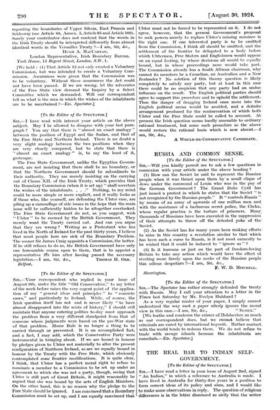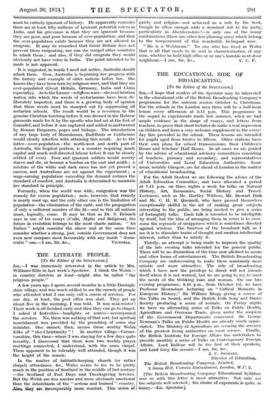TIIE REAL BAR TO INDIAN SELF- GOVERNMENT.
[To the Editor of the SPECTATOR.] Srn,—I have read a letter in your issue of August 2nd, signed "An Indian," in which a reference to Australia is made. I have lived in Australia for thirty-five years in a position to form correct ideas of its policy and aims, and I would like to make some observations in reply. The question of religious differences is in the letter dismissed so airily that the writer
must be entirely ignorant of history. He apparently concedes there are at least fifty millions of ignorant potential voters in India, and his grievance is that they are ignorant because they are poor, and poor because of over-population, and that the over-population exists because they are not allowed to emigrate. It may be remarked that Great Britain does not prevent them emigrating, nor can she compel other countries to admit them ; and also, if they did emigrate they would obviously not have votes in India. The point intended to be made is not apparent.
It is suggested, in words I need not notice, Australia should admit them. Now, Australia is beginning her progress with the history and example of older nations before her. She knows they have been torn by religious wars, and that they are over-populated (Great Britain, Germany, India and China especially). As to the former—religlous wars—she is a Christian nation into which the weeds of sectarianism have been de- liberately imported, and there is a growing body of opinion that these weeds must be stamped out by suppressing all sectarian schools. The result would be a reversion to the genuine Christian teaching before it was dressed in the Hebrew garments made for it by the apostle who had sat at the feet of Gamaliel, and before it was captured and added to and twisted by Roman Emperors, popes and bishops. The introduction of any large body of Mussulmans, Buddhists or Confucians would clearly interfere with attaining this result. As to the latter—over-population—the north-west and north part of Australia, the tropical portion, is a country requiring much capital and much well-directed labour before it can be closely settled (if ever). Poor and ignorant settlers would merely starve and die, or become a burden on the east and south ; a mixture of the white and dark races has not yet proved a success, and Australians are set against the experiment ; a wage-earning population exceeding the demand reduces the standard of comfort, and Australia is determined to maintain her standard in principle.
Formerly, when the world was wide, emigration was the remedy for excess population ; now, however, that remedy is nearly used up, and the only other one is the limitation of population—the elimination of the unfit, and the propagation af only a sufficient number of the fit—and to this all nations must, logically, come. It may be that as Dr. S. Reinach says in one of his essays (Cults, Myths and Religions), the future in evolution belongs to the most chaste nation- "An Indian" might consider the above and at the same time consider whether a strong, just, outside Government does not even now compare most favourably with any inside " demo-



































 Previous page
Previous page